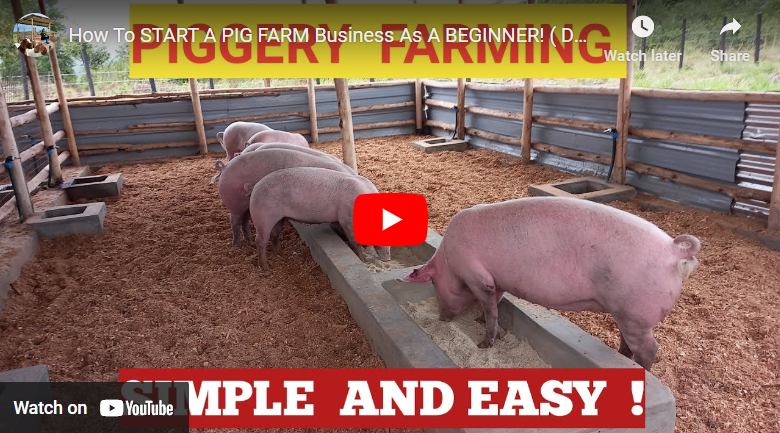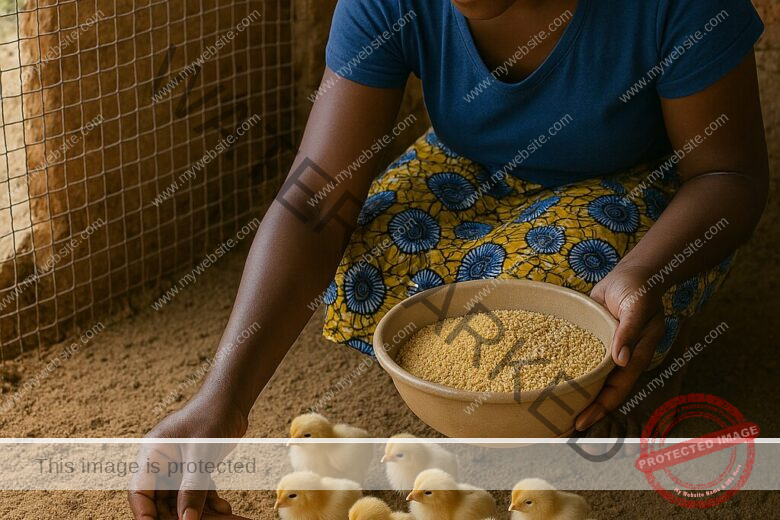Pig farming has been around for as long as any other type of livestock farming, and it can be a highly profitable venture. While pigs are primarily raised for meat, there are now emerging uses for pig products that make the industry even more lucrative.
If you’re planning to start a pig farm in Kenya, which is one of the most populous nations in Africa, there are several important steps you need to take, the key to successful pig farming in Kenya include finding the perfect location, choosing the right pig breeds, caring for and breeding the pigs, among other crucial considerations.
This article will provide you with all the necessary information you need to know about pig farming, so that you can avoid wasting time and start making profits just like other successful pig farmers in the country
How to Start Pig Farming Kenya
If you’re passionate and determined to succeed, you can venture into pig farming without feeling overwhelmed. The level of stress largely depends on the scale of your intended pig farm.
Since you’ve expressed interest in pig farming in Kenya, we’ll provide you with a step-by-step guide to help you get started.
Even if you’re a complete beginner, these instructions will guide you through the process.
Read Also: [Beginners Guide] Kenya Profitable Goat Farming
Step 1: Find the Ideal Location
The first step is to search for a suitable location where you can rear your pigs. The location should have enough space to accommodate the number of pigs you intend to farm.
It should also be a clean and pollution-free area with access to clean water. Additionally, the location should be easily accessible by you and your customers.
Step 2: Build the Farm Infrastructure
Once you have found the perfect location, it’s time to set up the infrastructure for your farm. You’ll need to construct or purchase pig housing that suits your farming needs.
This can include pens, wired houses, building pig houses, or open grazing with control measures. You should also set up fencing systems to protect your pigs from predators and thieves.
Step 3: Purchase Necessary Equipment
To care for your pigs, you’ll need specific equipment such as feeders, lightning systems, drinkers, bedding, cleaning tools, fencing tools, and caring equipment. Buy these things from a dependable vendor.
Read Also: [Beginners Guide] How to Start Cattle Farming in Kenya
Step 4: Acquire Pig Variety
Acquire your preferred pigs from a reliable breeder or farmer. Look for young and healthy pigs without deformities or disease traits.
Step 5: Stock Your Pigs
Stock your pigs in the housing area where they’ll be cared for and monitored for disease and pest infestation.
Ensure that you don’t overcrowd the pigs to avoid the outbreak of disease and optimal loss.
Step 6: Manage Your Pigs
Managing your pigs is critical to ensure their health and well-being. You should feed them regularly with a balanced diet that includes protein, carbohydrates, and essential vitamins and minerals.
Monitor their health and behavior daily, and provide necessary medical care and treatments if needed. This may include regular veterinary check-ups and vaccinations.
Read Also: [Beginners Guide] How To Formulate Poultry Feed In Kenya
Step 7: Breed Your Pigs
If you plan to breed your own pigs, you’ll need to carefully manage your breeding program to ensure the health and quality of your piglets.
Here are the steps you should follow:
Step 1: You should Select Healthy Breeding Sows And Boars
It is critical to select pigs for breeding that are healthy, disease-free, and free of genetic defects. Look for sows and boars that are in good body condition, have healthy skin, and have a pleasant temperament.
Read Also: [Beginners Guide] Hydroponic Fodder Production For Pigs PDF
Step 2: Manage Breeding Cycles
Every 21 days, your female pig (sow) will go into heat, and this is the best time to breed her. You have the option of allowing the sow to mate naturally with a boar or using artificial insemination.
Monitor your sow’s behavior and body condition during breeding to ensure she’s healthy and mating successfully.
Step 3: Provide Proper Nutrition
Your breeding sows and boars require a balanced and nutritious diet to ensure they’re healthy and can produce healthy offspring. Make sure they always have access to clean water and feed them a diet rich in protein, vitamins, and minerals.
Read Also: 10 Common Viral Pig Diseases And How To Treat
Step 4: Care For Newborn Piglets
When your sow gives birth, you’ll need to ensure that the piglets are healthy and receive proper care.
This entails keeping an eye on their weight gain, making sure they have access to the sow’s milk, and giving them a warm, tidy environment.
Step 8: Sell Your Mature Pigs
Once your pigs reach marketable size, you can sell them to your desired customers. To decide when to choose and sell them, keep an eye on their development and general well-being.
Read Also: 10 Common Diseases In Piglets And How To Treat It
Benefits of Pig Farming in Kenya
- High Demand: There is a high demand for pork in Kenya, which means that there is a ready market for pig farmers. This is due to the country’s growing population and a rise in the middle-class population with an increased demand for meat.
- High Reproduction Rate: Pigs reproduce rapidly, and it takes a short period to get a return on investment. Female pigs can produce up to 20 piglets in a year, making pig farming a profitable venture.
- Pig farming requires less land: Unlike other livestock, pig farming requires less land, making it an excellent venture for small-scale farmers. You can keep pigs in small spaces or backyards, making it an ideal venture for urban and peri-urban farmers.
- Pig farming generates by-products: Pig farming produces several by-products, including pig manure, which can be used as fertilizer for crops. Additionally, pig fat can be processed into soap and candles, and the skin can be used to make leather products.
- Pig farming is a low-risk investment: Pigs are hardy animals and can withstand different weather conditions. They are also resistant to several diseases, making pig farming a low-risk investment.
Read Also: 10 Common Diseases In Pigs And Treatment
Cost of Starting a Pig Farm In Kenya
- Land: Depending on the size of the farm, acquiring land is a significant cost. Renting land is a cheaper option for small-scale pig farmers.
- Pig Housing: Constructing housing facilities for pigs is a significant cost, but it is a necessary investment. The housing should be well-ventilated and should have adequate space for the pigs to move around.
- Feeding: Pigs require a balanced diet to grow and be healthy. The cost of pig feed will depend on the size of the farm and the number of pigs.
- Breeding stock: The cost of acquiring breeding stock can vary, depending on the breed and the age of the pig.
- Labor: Pig farming requires significant labor, which can increase the cost of starting a pig farm. Labor costs include wages for workers, veterinary services, and other related services.
Read Also: [Beginners Guide] How to Start Cricket Farming in Kenya
Projected Profit Of Pig Farming
The profit of pig farming in Kenya will depend on several factors, including the size of the farm, the number of pigs, and the selling price.
However, on average, a well-managed pig farm can generate a net profit of Ksh. 300,000 to Ksh. 500,000 per year.
Common Diseases and Pests of Pig Farming Including Treatment
- African swine fever: This is a viral disease that can cause high mortality rates among pigs. The best way to prevent disease is through vaccination.
- Foot-and-Mouth Disease: This is a highly contagious viral disease that can affect pigs’ hooves and mouths. Vaccination can help to prevent the disease so ensure you vaccinate your pigs.
- Internal Parasites: Internal parasites such as roundworms and tapeworms can cause illness and slow growth in pigs. Deworming and good hygiene practices can help prevent internal parasites.
- External Parasites: External parasites such as lice, ticks, and fleas can cause skin irritation and anemia in pigs. Regular treatment with anti-parasitic drugs can help prevent external parasites.
- Respiratory Infections: Pigs are prone to respiratory infections, which can cause coughing, sneezing, and breathing difficulties. Proper ventilation and regular cleaning of the pig housing can help prevent respiratory infections.
Read Also: [Beginners Guide] How To Start Ostrich Farming In Kenya
How much is pig sold in Kenya
The price of pigs in Kenya varies depending on several factors such as age, weight, breed, and location.
On average, a mature pig can sell for between KES 15,000 to KES 25,000. However, prices may be higher or lower depending on market demand and supply.
Best practices of pig farming in Kenya
- Hygiene and sanitation: Maintain a clean environment for the pigs to prevent diseases and pests. Regularly clean the pigsty and provide clean drinking water.
- Proper feeding: Pigs should be fed a balanced diet to ensure they remain healthy and grow well. Provide a mix of protein-rich foods, such as soybean meal and fishmeal, and carbohydrate-rich foods, such as maize and millet.
- Regular vaccination: Pigs should be vaccinated against common diseases to reduce the risk of infection. Consult with a veterinary doctor to determine the appropriate vaccination schedule for your pigs.
- Proper record-keeping: Keep accurate records of pig breeding, feeding, and medication. This will help you track the performance of your pigs and identify areas that need improvement.
- Proper breeding and selection: Select healthy breeding sows and boars with good genetics to ensure the health and quality of their offspring. Monitor breeding cycles to ensure successful mating.
Challenges Of Pig Farming In Kenya
- Disease Outbreaks: The biggest challenge of pig farming in Kenya is disease outbreaks. Pigs are susceptible to a wide range of diseases that can quickly spread throughout a herd and result in significant losses.
- Lack of Adequate Veterinary Services: Another challenge that pig farmers in Kenya face is the lack of access to veterinary services. This makes it difficult for farmers to diagnose and treat diseases in their herds, leading to significant economic losses.
- Feed Costs: Pig farming requires a significant amount of feed, which can be expensive, especially during periods of drought when feed prices are high.
- Poor Market Linkages: Pig farmers in Kenya often struggle to find reliable markets for their products. This can result in lower prices for their pigs, leading to reduced profits.
- Limited Access to Finance: Access to finance is another major challenge for pig farmers in Kenya. Without adequate financing, farmers may struggle to purchase inputs or invest in infrastructure improvements.
Where To Sell Pigs In Kenya
- Auction Markets: Pig farmers in Kenya can sell their pigs through auction markets, where buyers bid on animals based on their weight and quality.
- Direct Sales to Butcheries and Supermarkets: Another option is to sell pigs directly to butcheries and supermarkets. This can be more profitable for farmers, but requires a reliable network of buyers and a consistent supply of quality pigs.
- Farmers’ Markets: Farmers’ markets are also a popular place for pig farmers to sell their products. These markets provide an opportunity for farmers to connect directly with consumers and sell their products at higher prices.
- Export: Pig farmers in Kenya can also explore the option of exporting their products to other countries. However, this requires compliance with strict export regulations and quality standards.
- Online Platforms: Online platforms such as social media and e-commerce websites can also be used to sell pigs and pig products in Kenya.
Industries that Demand Pigs in Kenya
- Meat Industry: The meat industry is the largest consumer of pigs in Kenya. Butcheries and meat processing companies rely on a steady supply of quality pigs to meet the demand for pork products.
- Pet Food Industry: The pet food industry is another important consumer of pigs in Kenya. Pigs are used as a source of protein in some types of pet food.
- Pharmaceutical Industry: Pigs are also used in the pharmaceutical industry to produce insulin and other medical products.
- Leather Industry: The skin of pigs can be used to produce leather products, which is another industry that demands pigs in Kenya.
- Biogas Industry: Pigs produce a significant amount of waste, which can be used as a source of energy in the biogas industry.
Pig Farming Business Plan
Pig farming is a profitable business venture in Kenya, and having a comprehensive business plan is essential for its success.
A pig farming business plan should include the following:
- Executive Summary: This section should provide an overview of the business, including its objectives, target market, and financial projections.
- Market Analysis: Conduct a market analysis to determine the demand for pork in the local market, the competition, and pricing.
- Products and Services: Describe the type of pigs that will be raised, their age, and weight. Highlight the pig farming practices to be used to ensure that the pigs are of high quality.
- Marketing and Sales: Identify marketing strategies such as partnerships with pork dealers, supermarkets, and butchers. Also, outline your pricing strategy.
- Operations: Detail the daily operations of the business, including the number of pigs to be raised, their feed requirements, and breeding program.
- Financial Projections: Provide financial projections for the business, including start-up costs, projected income, and expenses.
Richest Pig Farmer in Kenya
Kenya’s richest pig farmer is Sammy Muhuri, who is based in Kilifi County. Muhuri is an award-winning farmer, recognized for his successful pig farming business.
His success is attributed to his use of modern pig farming practices, including the use of technology in breeding and feeding pigs.
He also employs a team of experts to manage his business operations, which has helped him to grow his pig farming enterprise.
Pig Farming in Kenya Manual PDF
Pig farming in Kenya manual PDF is a comprehensive guide that outlines the various aspects of pig farming in Kenya.
The manual provides detailed information on pig farming practices, including breeding, feeding, and disease management.
It also highlights the various pig breeds, their characteristics, and the market demand for pork in Kenya.
How Much Does Farmers Choice Buy Pigs in Kenya
Farmers Choice is a leading pork processing company in Kenya, and they buy pigs from farmers at competitive prices.
Farmers Choice buys pigs based on their weight, with a price range of Ksh. 220 to Ksh. 240 per kilogram.
The company provides a ready market for pig farmers in Kenya, making it a popular choice for many pig farmers.
Pig Farming for Beginners PDF
Pig farming for beginners PDF is a guide that provides detailed information on how to start a pig farming business.
The guide covers essential topics such as selecting pig breeds, housing, feeding, and disease management.
It also includes information on the required equipment, cost of starting the business, and marketing strategies for selling pork products.
Challenges of Pig Farming in Kenya
Pig farming in Kenya faces various challenges, including the outbreak of diseases, inadequate funding, and lack of proper infrastructure. Other challenges include the high cost of pig feeds and the limited market for pork products.
However, with proper planning and management, these challenges can be overcome, and pig farming can be a profitable venture in Kenya.
Pig Farming for Beginners: 3 Simple Ideas
Pig farming for beginners can be overwhelming, but there are three simple ideas that beginners can implement to start their pig farming business. These include:
- Starting with a small number of pigs and gradually increasing the number as the business grows.
- Focusing on raising pigs for meat production, as it is the most profitable aspect of pig farming.
- Employing modern pig farming practices such as technology in breeding, feeding, and disease management.
Pig Farming Requirements
To start a pig farming business in Kenya, the following requirements must be met:
- Sufficient land for pig housing and outdoor space for the pigs to graze.
- Access to clean water and adequate feeding facilities.
- Knowledge of modern pig
Conclusion
Starting pig farming in Kenya requires careful planning, adequate capital, and knowledge of the market and best practices. New entrants should conduct thorough research, develop a comprehensive business plan, and seek advice from experienced farmers. With dedication and commitment, pig farming can be a profitable venture in Kenya.





One Reply to “[Beginners Guide] How to Start Pig Farming Business Kenya”